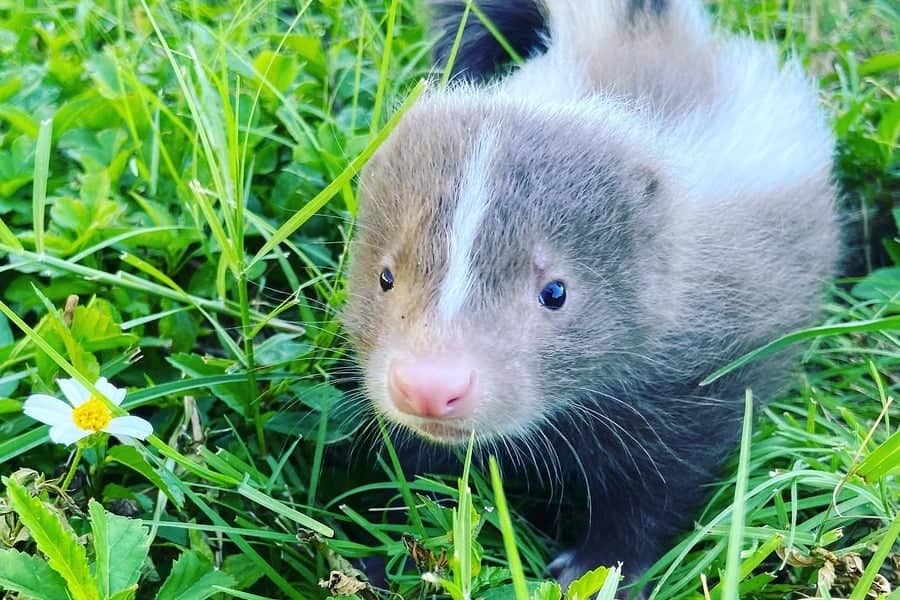Skunks are not aggressive toward humans, but their presence in your yard can be a real problem. An animal can come into your yard one day by accident and disappear just like that. But what if the pest regularly comes to your property, ruins your lawn, and leaves behind an unpleasant smell? If you notice that a stinker is increasingly appearing in your garden, it’s time to learn how to get rid of a skunk in your yard.
[wpsm_titlebox title=”How to Get Rid of a Skunk in Your Yard?” style=””main””]
-
- Make sure you are dealing with a skunk.
- Learn ways to deter skunks from the yard.
- DIY skunk repellent or buy one from a store.
- Make sure skunk repellent is safe for dogs or other animals.
- Spray your yard.
- Remove all potential hiding places for skunks from the yard.[/wpsm_titlebox]
How Do You Know if You Have Skunks in Your Backyard?
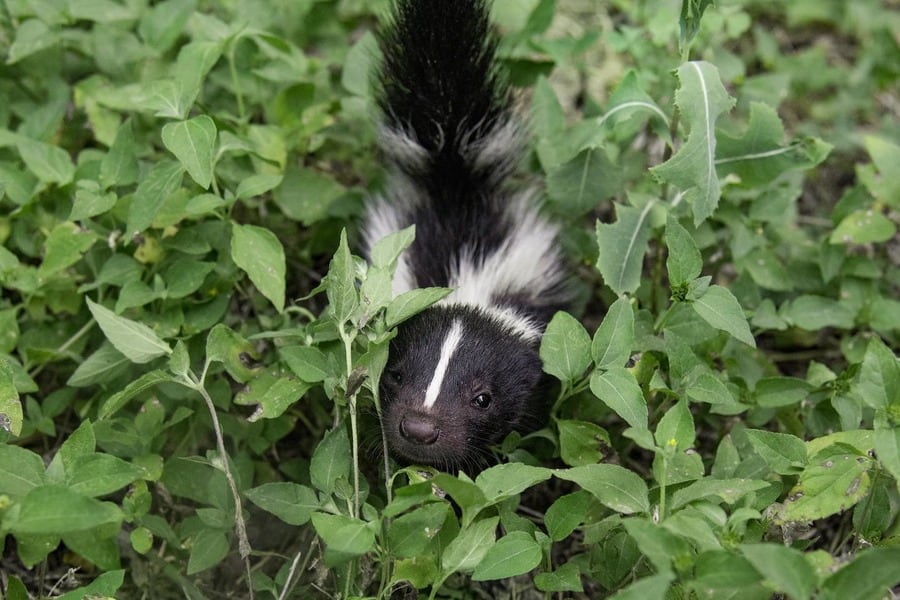
Skunks are nocturnal, so there is very little chance that you will see a skunk in your yard during the day. But if you notice obvious signs of this pest in your garden, here are some tips to help identify the skunk.
-
-
- Paw prints. A paw print with 5 toes on your garden’s ground might make you think it is a raccoon. After all, both a skunk and a raccoon have rather large paws with 5 toes, so you can easily confuse them. However, unlike a raccoon, a skunk leaves finger and claw marks. But, only 4 of the 5 toes will be visible, and there will be no heel mark.
- Coat coloration. The most common skunk species in the United States is black with white stripes. This animal is about the size of a cat, with short legs, large feet, and long claws. There is another kind of skunk that is slightly smaller. It is a spotted skunk. But this kind of animal is much rarer.
- Smell. The most obvious sign is that a skunk has been in your yard. The pest sprays its secret if it is startled by something and feels threatened. Although the skunk may have sprayed its repellent secret in one spot, its scent is so strong that it can spread several yards. If you walk out into the yard one morning and hear the smell of rotten eggs, it’s the work of none other than a skunk.
- Burrows in the ground. Skunks can dig in the soil to find larvae or insects. Characteristic burrows 3 to 4 inches deep may also be the work of the skunk’s paws.
-
As you can see, it is quite possible to find out on your own who is making a mess in your yard. You just need a little patience and observation.
[su_youtube url=”https://www.youtube.com/watch?v=q8WxQbkErxw”]
How to Get Rid of a Skunk in Your Yard?
So, you have determined that a skunk is coming into your yard. Or maybe it has already settled somewhere near your house, but you don’t know how to chase it away yet. You want to banish the knave as soon as possible, so in an emergency, you start looking for the best way to get rid of a skunk. Do not despair early, and do not rush to panic. Yes, fighting a skunk is a long process. I will share with you a step-by-step guide that will help you to avoid skunks appearing on your property.
Step 1. Limit access to food for the skunk
Don’t leave the pest a chance to satisfy its hunger in your yard. One of the first reasons why a skunk comes to your territory is because it’s hungry. For example, you should have dinner in the yard and leave a dish with leftovers overnight, as the pest is there. If you have this habit, show the skunk that you have no food for it, and be sure to put the dishes and food away in the house. The same goes for garbage cans. If you throw food scraps in it, the bins should be securely closed so the animal can’t get into them.
Step 2. Unpleasant smells for skunks
If you notice a skunk burrowing in your garden, try scaring it away with pungent smells. The animal feeds on insects, so it is not surprising that it tries to find them in your flowers. Although the skunk emits a highly unpleasant odor, some smells can deter it.
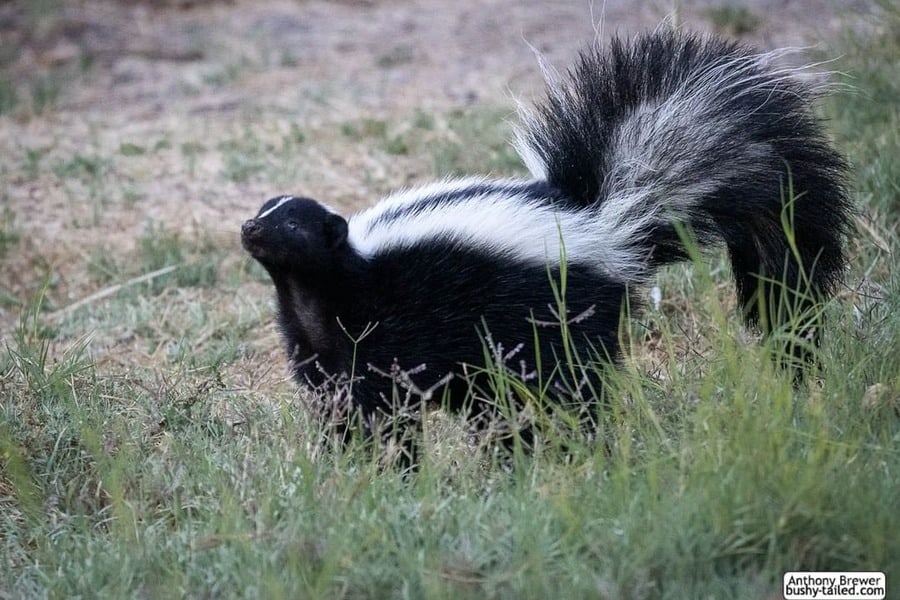
-
-
- If you often eat lemons or other citrus fruits, don’t rush to throw away the peel. You can use it as a weapon. Harmless to us, the smell of citrus can displease the skunk. Just put the peels around your yard, especially near flowers or other plants.
- If the previous method did not work or is not convenient for you, go to the garden store. There you can buy a special repellent for skunks. It is a pellet that smells like cloves, pepper, garlic, etc. In a word, the smell is acceptable for us, but the pest will not be satisfied. There are usually easy-to-follow instructions included with the product, but you will most likely need to sprinkle the product on potentially attractive areas for the skunk. If you have children or pets and are concerned that the repellent might harm them, ask your retailer for advice on what is best to buy. He can help you find pellets made from natural materials that won’t hurt your animals, children, or plants in the garden.
- If you do not dare to buy a specific product in the store but still need something more effective than the smell of citrus fruits, you can make a homemade skunk repellent. You can use simple products that you probably have in your kitchen. Mix onions, hot peppers, and cayenne pepper and boil for a few minutes. Treat the yard with the decoction. But don’t rush to treat your entire yard. First, test the action of the decoction on a small area to certify that it will not harm your plants.
- The smell of ammonia can scare the skunk away. It’s intense but not completely safe if you have children or animals. If you decide to use ammonia, soak rags in it and spread it around the yard.
-
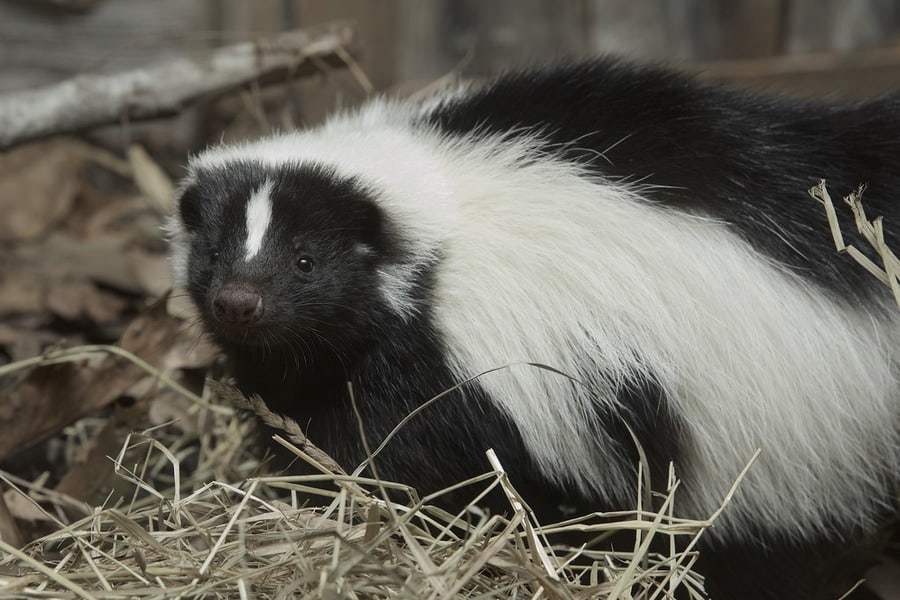
All of these remedies can only be effective if used regularly. You will need to re-treat every couple of weeks or once a month, which is the only way to get rid of skunks permanently.
Step 3. Don’t leave any hiding places for skunks
Pests can hide in tall bushes, piles of shrubbery, or various decorations in your garden. Try to minimize such hiding places for skunks. Clean up your yard to provide as much open space as possible. A skunk will not want to do its nasty things in front of you.
Step 4. Add lighting to your yard
Skunks come to your property when it’s dark outside so no one can see them. You can disrupt the pest’s plans with additional lighting. If you’re worried about energy consumption, you can install solar lights on your lawn or along your walkways. These will gather enough light during the day to illuminate your yard all night long. That will be atrocious for skunks but good for your property. An alternative would be a motion-sensing lantern. A light that suddenly comes on can scare the pest away.
These methods will help you let the skunk know he is not welcome if he starts to visit your yard. You can also use the above methods to prevent pests from entering your yard. For example, if your neighbors have already encountered such a problem.
But sometimes, the situation gets totally out of control. A skunk settles somewhere under the porch of your house, and it is difficult to get it out of there. Or even worse, it has brought its offspring. If the problem of skunks in your yard has begun to acquire global proportions, or you do not have time to fuss in your yard, you can turn to professionals. That is usually a last resort, but they can humanely catch the stinker and remove it from your yard.
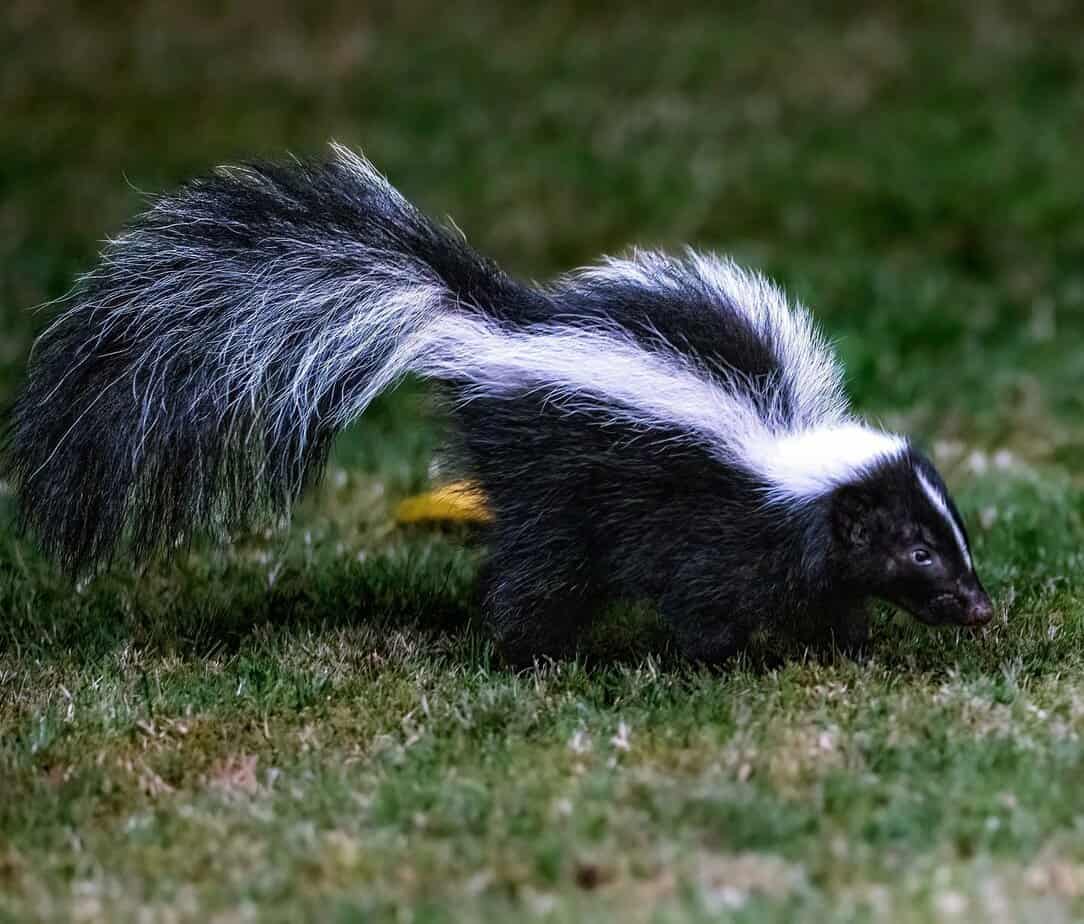
How Do You Get Rid of the Skunk Smell?
The skunk spray has a slightly greasy consistency, so the smell lasts longer. If the pest squirted out in your yard and you don’t do anything about it, the odor can last about 3 weeks. Yes, the skunk jet odor is one of the hardest to get out of, but it is realistic to do on your own. I’ll tell you how to proceed in 3 typical situations.
The smell of skunk in the yard
Skunk spray is most often on porous surfaces such as wood, yard tiles, etc. In that case, treat these areas with a mixture of water and bleach. Prepare a solution of one gallon of water and one cup of bleach. Apply the resulting solution to the areas that the skunk has marked and immediately rinse the area with water. This solution has a deodorizing effect, so it will help get rid of the odor. Be sure to test the product in a small area to guarantee you don’t ruin the plants or items in your yard.
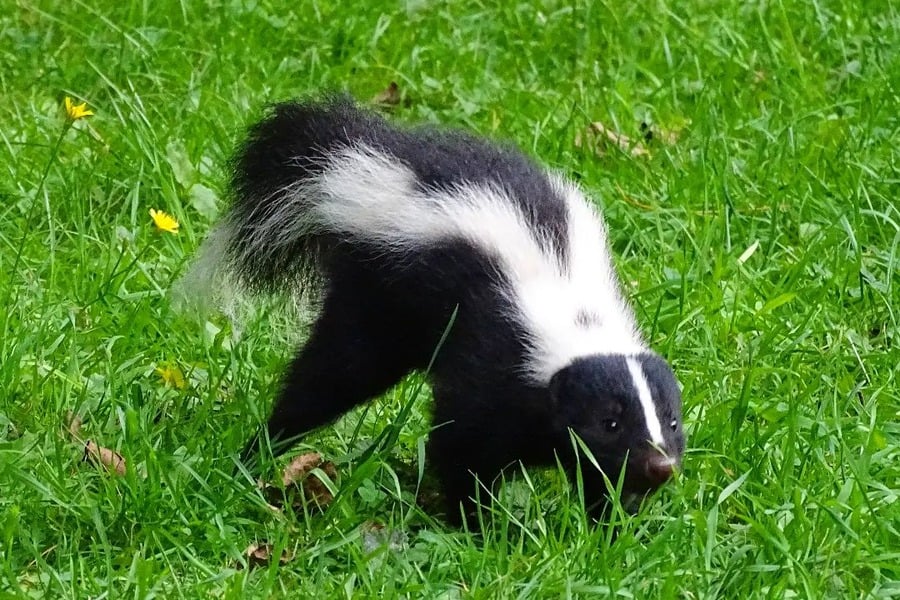
A jet of skunk hit a pet
It is good if you have a special shampoo for skunk odor removal. But if your animal has just fallen under the stream of skunk, and the proper shampoo was not at hand. You need to act quickly to prepare a solution from simple improvised means. Mix baking soda, hydrogen peroxide, and dishwashing liquid. Bathe the animal with the resulting solution, but do not leave it on the coat for too long. The bleaching properties of hydrogen peroxide can change the color of your pet’s fur. If the skunk’s secret got on the collar, you should wash it at the highest temperature if the collar material allows it. Otherwise, it is best to replace it.
Do not leave the prepared remedy “for later” under any circumstances. It can explode if you leave it in a closed bottle. Use it immediately after preparation and pour the excess out.
A jet of skunk got on you
If the spray got on your clothes, you can wash them at high temperature with powder and a couple of spoonfuls of baking soda. If the skunk’s secret has ended up on your skin, shower with a degreasing agent. For example, dishwashing detergent or shampoo for oily hair. If you can, take a bath with a few spoonfuls of baking soda. Afterward, rinse your skin thoroughly with soap and water.
Sometimes skunk jet odors can waft into your home. If this happens, try to let as much sunlight into the house as possible and ventilate the room. You can also treat hard surfaces with a solution of water and bleach. Linens, towels, and other items should be washed in a washing machine at a high temperature. Treat sofas, mattresses, and carpets with steam if they also have an unpleasant odor.
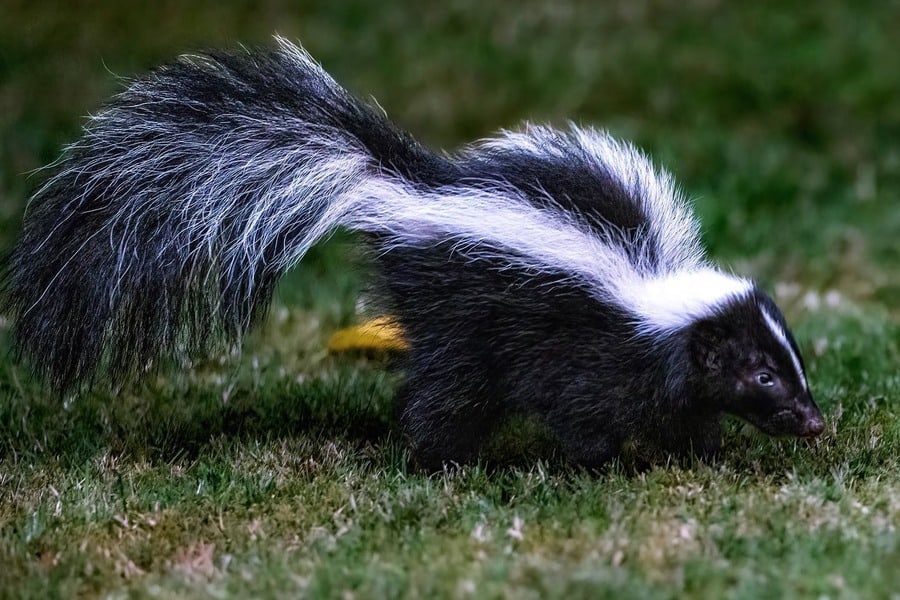
FAQ About Skunks in Your Backyard
In this section, you’ll learn a few more facts about skunks that should help you control these pests.
Where do skunks live during the day?
Skunks are more active at night and may sleep in burrows underground during the day. During the warm season, skunks may leave their holes during the day and sleep in thickets of grass, for example.
What months are skunks most active?
Skunks are more active in spring when they wake up from hibernation and begin to breed. Also, animals usually become more active by September, when their cubs are growing up. The adult animals are teaching the babies how to get food. Skunks are also more active at this time as they seek shelter for hibernation.
What food is poisonous to skunks?
Skunks are practically omnivores, but some foods are toxic to the animal. Foods that can poison a skunk are onions, avocado seeds and peels, cat food, and even chocolate.
Don’t Let Skunks Ruin Your Lawn
I hope this article has helped you understand this problem, which has several solutions. At least now you know where to start. It’s up to you to drive the pests out of your yard yourself or contact a professional. The main thing is to act quickly before the problem begins to worsen.
Also read:
- Can Skunks Climb a Fence
- How to Scare a Skunk Away
- Do Mothballs Keep Skunks Away
- Best Skunk Baits in 2022
- How to Stop Skunks From Digging up Lawn
- How to Get Rid of Skunk Under Deck
- Home Remedies for Keeping Skunks Away
- Do Skunks Live Underground
- What Sound Does a Skunk Make
Have you ever had to deal with skunks? How did you get rid of their smell?

